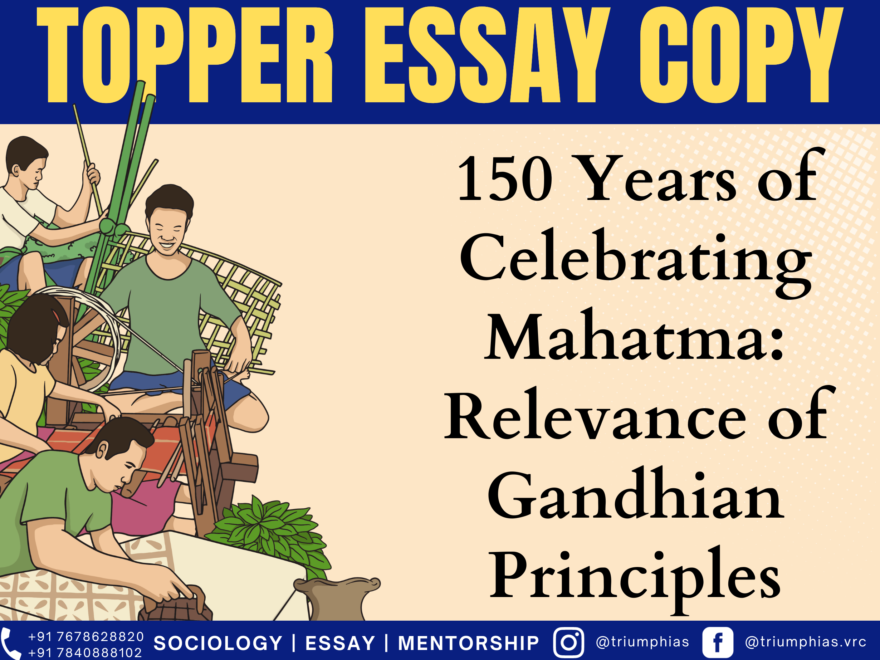
Aishwarya Singh
Essay Topic:
150 Years of Celebrating Mahatma- Relevance of Gandhian Principles
(Relevant for Essay Writing for UPSC Civil Services Examination)
150 Years of Celebrating Mahatma- Relevance of Gandhian PrinciplesA young and frail man, often seen as being too fragile to bring about any substantial change at the provincial level, let alone the global level, enters the political dynamics of 20th century India. With just a stick in his hand and a loincloth to cover himself up, he experiments with truth. In this process, he brings down a 200-year-old empire, which often sneered at and belittled him, giving to the world a new and ‘free India’. This man was Mahatma Gandhi. Mahatma Gandhi, even 150 years after his birth, continues to be a force to reckon with. He was not just an individual with prescriptions about polity, economy, life, etc. He was an idea, an embodiment of principle which becomes increasingly important and relevant with each passing day. He symbolizes ideals which must govern our conduct given the increasingly tumultuous and uncertain times 21st century has to offer. Gandhi laid immense emphasis on the need to pursue non-violence, however tumultuous the situation may be. He posited that violence was for the weak, and only those who had self-control and grit could control the animalistic urge to act with force. This idea has become increasingly important in the present context, with various forms of violence perpetuating themselves. Be it violence against women, countries going to war, genocide, crimes against humanity, or cybercrime, there is a spurt of violent activities. Gandhi’s ideas become relevant in creating an awareness among individuals that violence begets violence, and no good has ever come out of violent means. The grief that terror attacks like 9/11, 26/11, and the Easter bombings brought about or the state suppression seen in China in the 1989 Tiananmen Square reflect how only when we adopt a peaceful approach to problems is a sustainable solution found. This idea can find inflection in the government’s effort to bring peace in Nagaland via interlocution, thus setting a positive precedent. Greater democratization via peaceful resolution of linguistic, religious, and ethnic discords relied on the Gandhian ideal of ‘Ahimsa’. Gandhi’s focus on Satyagraha for the peaceful resolution of discords, hinged on resisting unjust laws, and standing up for what is right. Given the innumerable challenges facing the world today, such as Chinese aggression in the South China Sea in violation of UNCLOS principles, suppression of rights in many countries and an emerging growth of state-led violence as seen in Sudan, the ideal of Satyagraha becomes critical to oppose injustice. It will provide a template to people to engage with the violent force for a recognition of their rights. In India, the recognition of forest rights after the Chipko movement marked an astounding success of the rights of deprived sections. This can be repeated on a larger scale at the global level. That the Chipko movement was led by women embodied another Gandhian ideal – that of the empowerment of women. Gandhi emphasized the need to engage women in the public sphere and played a critical role. This emphasis has immense relevance in today’s times when women are facing new and institutionalized forms of violence and threat. Overcoming this violence and fear of injustice, women can be empowered by making their presence felt. The fact that the Belarus protests against the strong arm of the state have been led by a woman, or that a woman was at the helm of countries like New Zealand and Germany when they effectively dealt with the COVID-19 pandemic proves that women, as Gandhi emphasized, have an immense ability to effectively not just participate in, but lead in public life. Gandhi’s efforts at transforming the public life also led him to provide the concept of Swaraj or freedom. For Gandhi, one was free when one could control one’s desires and not give in to greed; He emphasized how there is enough for everyone’s need but not for everyone’s greed. Issues of exploitation of natural resources, including the global commons, wars for resources, contestation and militarization due to inhibited access, neo-colonialism, and imperialism are but a few instances of why the Gandhian ideal of Swaraj is essential. In incorporating Swaraj and control over desires, solutions can be found for problems such as the scramble for land, rivers, and even outer space. An instance of this incorporation is in the acknowledgment that no global commons can be appropriated by any one country and all must contribute to its welfare – the mending of the ozone hole after years stands testimony to the benefits of cooperation over contestation when it comes to resources. The emphasis on cooperation over contestation also found resonance in the Gandhian principle of Sarvodaya. He put forth the need for all, be it workers, capitalists, peasants, landlords, etc., to cooperate rather than view their interests as irreconcilable. This principle becomes relevant due to the increased exploitation of workers, greater inequality in the appropriation of resources, and a rising hostility among various sections of the economy. The institutionalization of CSR, provision of various benefits to workers via codes such as the Industrial Relations Code, Safety Code, can be seen as steps to entrench the Gandhian ideal. That the ILO has pushed for various reforms, and India has accepted most, is testimony to how cooperation, and not acrimony, can set the ground for shared prosperity and growth. The Gandhian vision for shared prosperity and growth relied on the ideal ‘Ramrajya’, with the principle of subsidiarity forming the core. It rested on the empowerment of the last man standing, the disempowerment of none. Instances of corruption, poverty at the rural level (for every Rs 1 spent, only 15 paisa reaches the poor), and greater concentration of power with some at the cost of disempowerment of the weaker sections of society such as Dalits, the Gandhian ideal of greater empowerment of the weakest sections becomes essential. Within India, legislations such as the Forest Rights Act, Prevention of Atrocities Act, principles of the fundamental Right to Equality and special provisions are reflective of this Gandhian ideal. Globally too, greater cooperation is seen for the uplift of the weakest, with various UN agencies working incessantly for weak sections like persecuted minorities, refugees, etc. This global effort for the uplift of the weakest sections also underlines another Gandhian idea – that each individual is an end in themselves and not a means to achieve another goal. This idea created an inextricable link between ethics and politics, putting forth the need to adopt high moral standards in political conduct. At a time when many view others as mere means to power and violate their agency by not working consistently to uplift them, the Gandhian ideal is a necessary recognition to ensure that people’s rights are respected, and their agency accepted. The acceptance of agency was a central idea in Gandhi’s rejection of the values that modernity brought with it: isolation, greed, and exploitation. Given today’s situation, the rise in psychological issues and mental health problems can be seen as an adverse impact of these very conditions. The relevance of building social capital, strong community ties, and engaging with others on an equal basis thus hold relevance even today. COVID-19 brought forth the ugly aspect of isolation and only reaffirmed the need for social capital as emphasized by Gandhi. It is thus evident that even 150 years later, the ideals of Gandhi remain just as, if not more, relevant. Gandhi’s revolution was not just political but it transcended all spheres of our life, becoming all the more significant given the transactional and uncertain times we live in. Gandhi’s way of life provided a template to deal with various difficult and challenging situations, however insurmountable they may seem, and to subsequently overcome them. Gandhi was the embodiment of values of peace, dignity, and justice – a frail man with just a stick and a loincloth to cover himself up, who brought down an entire empire. |
To master these intricacies and fare well in the Sociology Optional Syllabus, aspiring sociologists might benefit from guidance by the Best Sociology Optional Teacher and participation in the Best Sociology Optional Coaching. These avenues provide comprehensive assistance, ensuring a solid understanding of sociology’s diverse methodologies and techniques
Meta Tags:
Urbanisation, Blessing, Disguise, Economic Growth, Cultural Diversity, Environmental Challenges, India, Social Inclusion, Sustainable Development, SDG Goals, Urbanization is a blessing in disguise, Laxman Tiwari, Laxman Tiwari upsc, Laxman Tiwari CSE, Laxman Tiwari Essay copy, Laxman Tiwari Essay test copy
Why Vikash Ranjan’s foundation Classes for Essay?
Proper guidance and assistance are required to learn the skill of writing essay topics in CSE examination. VIKASH RANJAN SIR at TRIUMPH IAS guides students according to the Recent Trends of UPSC, making him the Best Essay Teacher for Essay writing UPSC.
At Triumph IAS, the Best Essay Writing Coaching platform, we not only provide the best study material and applied classes of Essay for IAS but also conduct regular assignments and class tests to assess candidates’ writing skills and understanding of the subject.
Choose The Best Essay Writing Teacher for IAS Preparation and Know our Approach for Essay?
- The Programme is Planned & Executed in a Way that You Write a good Essay for obtaining Effective Score of 140 Plus.
- In this programme we provide Classes on
- How to INTRODUCE The Topic in Context of the THEME of the Essay
- How to Elaborate & Explain the Topic-Theme on Temporal Scale & Sectoral Scale as well as Intellectual Scale in the MAIN BODY of the Essay.
- How to Sum up the Topic in CONCLUSION in Context of the Essay Topic Theme.
- ︎We will Teach You How to use the Knowledge Matrix of General Studies & Optional to write a Good Essay more Logically and Coherently.
- After the Classes You have to “Write to Learn & Learn to Score” .This means You have to Write the Essay Test Papers & Learn from the Feedback & Discussions.
Why Essay is Important and What We Offer in “Essay Test Series”?
- Triumph’s Essay Upgradation Test Series (Under Personal Guidance of Vikash Ranjan Sir) doesn’t only focus on improving student’s linguistic skills but also focus on improving student’s ability to comprehend the topic-sentence (subject) recall & relate the facts, concepts, propose thesis-statements, and logically assimilate the ideas & counter ideas with clarity in expression on temporal & Sectoral Scales of knowledge.
- Further students are provided one-on-one INTERACTION* Session with Vikash Ranjan Sir. Students get personal feedback on their strength and weaknesses, regarding what is ‘good about their essay and what more should be done to make it a better one’ by Vikash Ranjan Sir.
Why to take up this “Essay Test Series and Foundation” Course?
- Essay is Low hanging Fruit. Marks in Essay is Effectively Contributing in Final Selection in New Pattern of Mains Exam. With a Well Developed ‘Knowledge Matrix and Rigorous Practice’, One can Score upto 160 + in Essay. So IAS Aspirants should never Ignore Essay Preparation
- Inculcating Writing Competency in Essay for IAS, which is Different from Essay in English, Essay in School and College.
Follow us :
🔎 https://www.instagram.com/triumphias
🔎https://www.youtube.com/c/TriumphIAS
🔎https://t.me/VikashRanjanSociology
Find More Blogs…
| Compare and contrast Karl Marx’s and Max weber’s | Karl Marx- Historical Materialism |
| Position of Women In the Modern Indian Society | Sociology: Social system and pattern variables |
keyword: Relevance of Gandhian Principles, Relevance of Gandhian Principles, Relevance of Gandhian Principles, Relevance of Gandhian Principles, Relevance of Gandhian Principles, Relevance of Gandhian Principles, Relevance of Gandhian Principles, Relevance of Gandhian Principles, Relevance of Gandhian Principles, Relevance of Gandhian Principles, Relevance of Gandhian Principles, Relevance of Gandhian Principles, Relevance of Gandhian Principles, Relevance of Gandhian Principles, Relevance of Gandhian Principles , Relevance of Gandhian Principles, Relevance of Gandhian Principles, Relevance of Gandhian Principles, Relevance of Gandhian Principles

